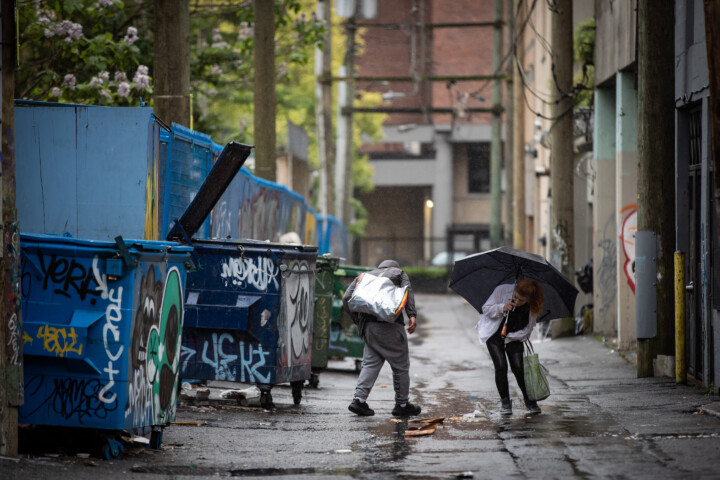The saintly editors here at The Hub have agreed to my request to produce one of my two monthly articles for the site as a monthly transatlantic diary. For those readers not familiar with the format, which is more common in British journalism, the diary is a grab bag of short items, sometimes on a common theme, but often not. In my case, what they have in common is that they are either too inconsequential to merit a full article or I can’t be bothered to come up with more than a knee-jerk reaction or a flip comment. This is November.
It came too late for the October diary, but Hallowe’en night found me back in London, this time for a dinner at the Middle Temple organised by the ARC conference. ARC was a sprawling gathering of the clans—self-styled conservatives, classical liberals, and various non-conformist sects, each evangelising its peculiar take on the one true faith, vigorously arguing and, occasionally, even more vigorously agreeing—but this event was removed both in space and spirit from the main gathering.
It was, dare I say, a very lawyerly affair in the best sense. Lawyers get a bad rap and as the profession has remorselessly legalised every walk of life, the rap has been well-deserved. But there is an older tradition, one that persists in wood-panelled and fustily-bewigged corners, where one may dimly perceive the ghostly sense of a profession that was once something quite different: a sort of City Guild-cum-philosophical academy that combined the studiousness of an Oxbridge library with the irreverence of an Oxbridge common room. There was at least a hint of that at this dinner, which took place in the Tudor hall where in 1602 the law students heard Twelfth Night performed, quite likely in the presence of Shakespeare himself, who lived just a short walk away.
Twelfth Night contains possibly the best puncturing of pomposity in English literature, when Sir Toby Belch reproaches the prim Malvolio with: “Dost thou think because thou art virtuous there shall be no more cakes and ale?” Cakes and ale were the theme of the next event in the calendar. Earlier this year, I was honoured to receive the Lord Alfred Douglas Memorial Prize, which is awarded by Oxford “for the best sonnet or other poem written in English and in strict rhyming metre.” Although he was a minor poet himself, Douglas is best remembered today as “Bosie,” the younger lover with whom Oscar Wilde carried on (and off and on) a relationship that today would fairly be described as “toxic.” From Reading Gaol, an anguished Wilde blamed Bosie for his downfall. They reconciled imperfectly after he was released, but Bosie, true to form, posthumously repudiated his whilom rakehell.
The prize was the idea of Sheila Colman, who befriended the aging and destitute Douglas in 1943 and cared for him until his death two years later. As thanks, Douglas left her the rights to his literary estate, from which she endowed the prize. The prize money is, ironically, the same amount that Bosie’s cousin Sholto posted for Wilde’s bail during his trials after Bosie declined to do so. At the time, I promised to spend my prize on something rather less worthwhile, and I fulfilled that pledge this month by treating two dozen Oxford friends to an evening of drinks at the King’s Arms. While I can find no reference to either Bosie or Wilde drinking at the KA, it was a favourite of 20th Century Oxford poets, including Philip Larkin, of whose style my winning poem is weakly derivative. Because enough people have asked about the poem, here it is:
Leaving you by train through England
Leaving you by train through England, the hours
slip past the window, quaint Saxon village
names blur by, tongue and time and distance merge:
brōc, brook, brūcan, broken, withered flowers
of frost-remembered summer, square towers
glimpsed through rattling glass, a dateless image
of permanence where Domesday lanes converge.
Outside the land dissolves in winter showers.
‘You know this beauty isn’t natural,
each acre has felt human hands, plough-cut,
wall-mended, a cultivated tuning
over time in place. Growth means renewal,
it’s habit and not change that leaves a rut,
living things require constant pruning.’
***
Politically, the news of the month over here was the return of former prime minister David Cameron to front-line politics. Responses were mixed, to put it mildly. The news was received best by the sort of corporate conservative who is prone to confusing what Norman Tebbit called “the insufferable, smug, sanctimonious, naïve, guilt-ridden, wet orthodoxy” with political sophistication. Others were less enthusiastic. In Compact, Peter Hitchens called it “a deliberate insult to conservative-minded voters” who “rightly blame him for the morally and socially liberal putsch that overwhelmed the Conservative Party in the years before 2010.” He warned that “such a stinging smack in the chops for so many formerly loyal Conservatives … will certainly cause some voters to defect rightward.” I disagree only with the last part, because I think Hitchens underestimates the degree to which conservative voters are inured to insult from the party that pretends to their philosophy. But it’s hard to improve on his conclusion that, “in between the crisis and the catastrophe, we may as well have a glass of champagne.” I couldn’t have said it better myself.
***
Also on this side of the pond, street violence in Dublin added momentum in that country for a new online hate speech law of the kind that civil libertarians invariably describe as “draconian.” In this case, they have a point. The proposed law would not only punish speech that is merely offensive or insulting, it would criminalise the mere “possession” of speech that is likely to incite hate. Because this could criminalise memes or messages on your phone, the law is a standing invitation to invade citizens’ privacy. Given the connection to peaceful and violent protests against the government’s radical immigration policy, it is hard not to conclude that the government sees the new law as an effective way to silence political critics.
This reminded me that our own Liberal government has so far failed to follow through on its own promise to introduce a law restricting online speech in Canada. I don’t know the reason for the delay, but I am grateful for it. I suspect one reason is advice from the Department of Justice that censoring Charter-protected speech would be starkly unconstitutional. This leaves the government with three choices, none of which is likely to excite the Attorney General: (1) introduce an unconstitutional law, while flagging its unconstitutionality to parliament; (2) use the notwithstanding clause; (3) or set a bar for acceptable online speech that matches Supreme Court precedent. Considering that the Supreme Court has advised that “[h]ate speech legislation is not aimed at discouraging repugnant or offensive ideas” and that Charter-protected speech includes “[r]epresentations belittling a minority group or attacking its dignity through jokes, ridicule or insults [that] may be hurtful and offensive,” this high bar is unlikely to satisfy Liberal activists who equate “hurt” with “hate.” The government appears to be stuck, and long may it remain so.

***
Towards the end of the month, I popped down to Winchester for lunch with an old friend. Even the crowds wandering among the sweat-shop trinkets and sugary mulled wine at the pop-up Christmas Village couldn’t obscure the charm of the city. We explored the Norman cathedral, paying our respects to the winsome genius of Jane Austen and to the six ornate bone chests containing the remains of Cynegils, the seventh century king of Wessex, King Cnut and his wife Emma, and several other Anglo-Saxon and early Norman kings and bishops. We marvelled especially at the sentimental splendour of the late Victorian and early 20th century funereal monuments. It is impossible to imagine an inscription today as floridly confident as that of Sir Gerald Herbert Porter, CB, KCMG, “Diplomatist Administrator Explorer,” who we are told, “displayed in his brief career the resolution, the wisdom, and the heroic courage by which empires are built up and by which alone they can be sustained.” Of domestic interest was the monument to Lt Gen Sir George Prevost, which laconically recorded his achievements: “St Lucia Taken, Dominica Defended, Canada Preserved.” Less triumphant but equally intriguing was the memorial to Edward Henry Le Marchant “who was shot by a fanatic at Peshawur [sic] on the 23rd of March 1899.” Sadly, some things never change.
***
Sticking with the Winchester theme, I rounded out the month with evensong at William of Wykeham’s Oxford college. Magdalen, Merton, and Christ Church chapels all have their charms, but there is nothing quite like evensong at New College. Row upon row of sculpted saints look down from their shadowy niches in the great reredos, as though curious to discover through the dim candlelight the source of the descants soaring to meet them. It is a beauty so pure it lacerates the heart and purifies the soul. Walking out into the cold night, for the first time this year I could see my breath. The end of the year beckons, and with it the end of this diary. It has been a personal indulgence, a chance to record some events probably of interest only to me alongside topical political and cultural observations too short to justify a full article, but I only ever intended it to run for one year. Next month will be the last entry.
Recommended for You

B.C. has ended drug decriminalization, but the problem still remains

‘Integration is subordination’: What Carney’s Davos speech means for the Canada-U.S. relationship

Over 105,000 patients left Canada for health-care treatments in other countries in 2025

The World Economic Forum is a failed institution




